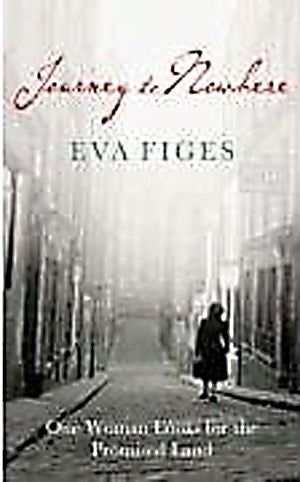Journey To Nowhere, By Eva Figes
Politics overshadows a fascinating personal story of life under the Nazis

Eva Unger came to London aged six when her German Jewish family fled Hitler in l936. They were a middle-class family with a maid, Edith: a middle-aged Jewish domestic who survived in Nazi Berlin by staying on the run. She was a bit-part player in the family drama but her charge, now Eva Figes, gives her a leading role.
Figes plots this book as a mystery. Edith eventually returns to the suburban London family, nostalgically hoping to recreate the life she had in Berlin. But the family has changed. Their house, instead of being a large Berlin mansion, is a four-bedroomed Hendon semi, where a servant is an embarrassment rather than a necessity. The narrative drive is Figes' memory of being a grammar-school girl who secretly roots out Edith's drama while her abusive mother is out of the house. A brief intimacy develops as Edith eventually finds someone who cares about her experiences.
Some of the strongest moments are the descriptions of Edith's survival in Berlin and the unexpected incidents that so contrasted with her mundane pre-war drudgery. Eva makes Edith bear witness to the "good Germans" who hid her, and those with more dubious motives who helped her in the hope that she would give them a post-war reference once the Allies were in place.
Figes follows Edith's story as it moves into the end of the Zionist dream. Edith, a truly displaced person, is ready to lead a meaningless life in post-war Berlin when she is recruited as a Zionist pioneer. In Palestine she expected community, acceptance and pride. Instead, the New Jews looked down on her as a hated German Jew and she was once again in exile. Her need for the Unger family was a yearning for those pre-war years.
Journey to Nowhere is a compelling read when it explores the relationship between Edith and Eva. The gulf across generations and class is touchingly evoked. However, several chapters castigate the creation of a Jewish state, and blame its existence on the US. Figes' research is illuminating, but the balance between the polemic and personal jars rather than delights.
The story of Eva and Edith would have been enough because the political subtlety seeps through the raw narrative. A servant's witness of Nazism, Zionism and the suburban English life of cultured immigrant Jews simultaneously offers the micro and the macro vision. There was no need to burden the narrative with polemic.
Subscribe to Independent Premium to bookmark this article
Want to bookmark your favourite articles and stories to read or reference later? Start your Independent Premium subscription today.

Join our commenting forum
Join thought-provoking conversations, follow other Independent readers and see their replies